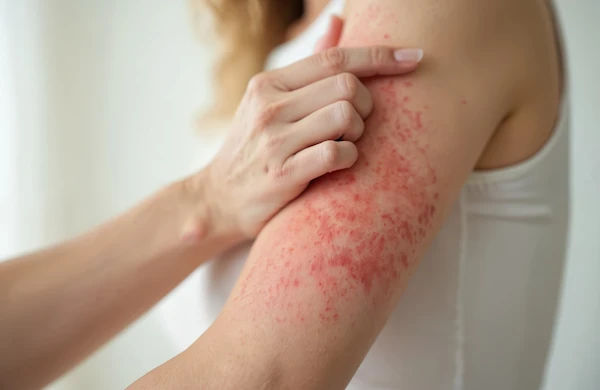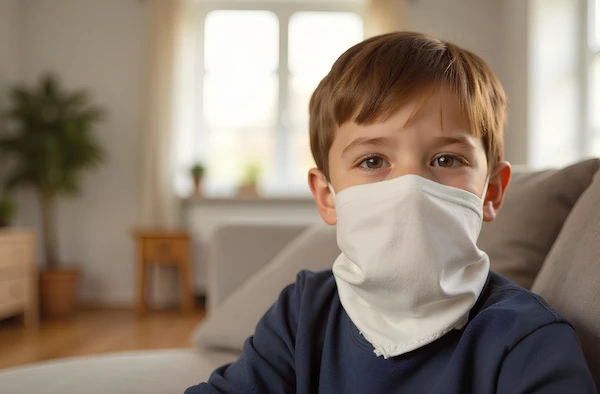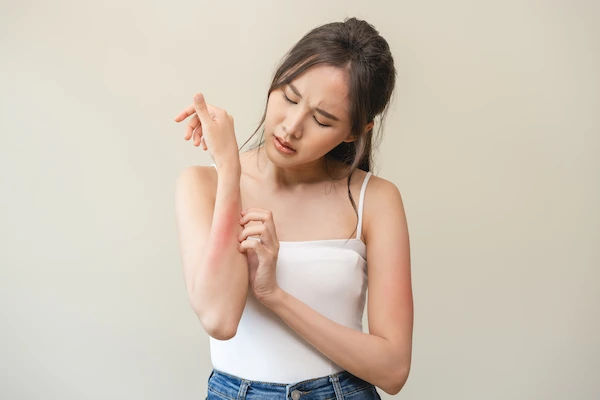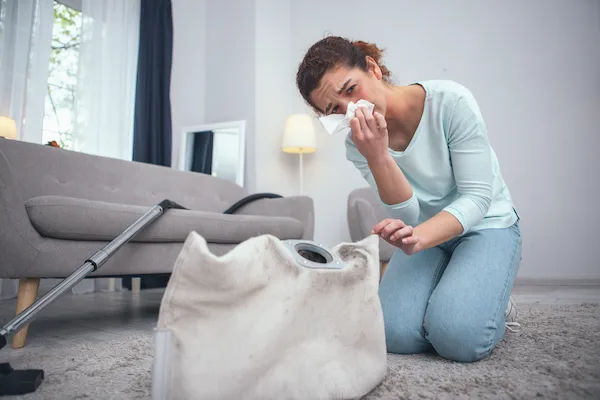Allergy Skin Tests: Types, Process And Results
Allergy skin tests comprise a range of methods that help with the medical diagnosis of various allergies. Keep reading to know about the types of tests, procedures, precautions & more.

Written by Dr Shreya Sarkar
Last updated on 3rd Jul, 2025
An allergy skin test is a medical procedure to detect the type of allergy one has. When an individual’s immune system reacts abnormally to specific substances, it is considered an allergy. The foreign substance causing an allergic reaction is an allergen. One may develop irritation or rashes from an allergic reaction, and avoiding timely treatment may worsen the situation.
Doctors often suggest an allergy skin test during such situations to detect the underlying reason for irritation. Keep reading to learn more about this test, its types, procedures, risks, and more.
Types of Allergy Skin Tests
There are three key types of allergy skin tests, as discussed below.
Skin Prick Test
This test helps detect food and airborne allergies such as animal dander, pollen, mould, dust, etc. It also helps detect medication or penicillin allergies, the venom of a stinging insect, etc., at the initial stage.
Intradermal Test
If the result of a skin prick test for insect venom (fire ants, bees, and hornets) and medication allergies comes negative, healthcare providers suggest an intradermal test. It also helps detect airborne allergies.
Patch Test
Individuals with contact dermatitis (rash or allergies caused by contact with things that irritate one's skin) should undergo a patch test.
When to Consider an Allergy Skin Test?
Doctors may suggest an allergy test if an individual has any of the following symptoms:
Watery or itchy eyes
Vomiting
Wheezing
Coughing
Hives
Breathing shortness
Sneezing
Headache
Sore throat
Runny nose
Additionally, doctors may suggest an allergy to diagnose if the patient has a history of any of these conditions:
Food allergies
Allergic asthma
Allergic rhinitis or Hay fever
Penicillin allergy
Dermatitis or eczema
Preparing for an Allergy Skin Test
One must follow some guidelines before going for an allergy skin test. Here are some of the things one must prepare for:
Medications to Avoid
Here are some of the medicines that can affect one’s allergy test and need to be avoided before the test:
Desipramine, nortriptyline, and other tricyclic antidepressants
Omalizumab, medicine for asthma
Hydroxyzine, a type of antihistamines
Ranitidine, cimetidine, or other heartburn medicines
Cetirizine, diphenhydramine, loratadine, fexofenadine, and other antihistamines
One must avoid such medications from 10 days before the allergy test to ensure accurate results.
What to Expect on the Day of the Test?
Skin tests take approximately 20 to 40 minutes and are usually performed at a healthcare facility. This is because the allergen used to conduct the allergy test may cause immediate irritation or reactions that may develop later.
How are Allergy Skin Tests Conducted?
The skin prick test is conducted in the following way, with differences between it and other tests explained below:
Step 1: A small amount of allergens that cause allergic reactions in an individual is placed on his upper arm, forearm, back, or any other skin part.
Step 2: Then, healthcare professionals prick the skin to let the allergen go under the surface of one’s skin.
Step 3: Next, the skin is observed for 15 to 20 minutes to detect signs of allergic reaction like redness, swelling, etc.
This method helps test multiple allergens at once.
Differences Between Test Types
The intradermal and patch tests differ in their methods from the skin prick test. The intradermal test involves injecting a small amount of allergen just under the skin’s surface.
In contrast, the patch test places allergens on the skin in patches for 48 hours, with results checked after 72 to 96 hours to identify delayed allergic reactions.
Interpreting Results of Allergy Skin Tests
Allergy test results are of two types: positive and negative. When an individual is diagnosed allergic to specific substances, the result is positive; if they are not, the result is negative. Based on the results, doctors may introduce medicine or immunotherapy. In some cases, changing the work or home environment and diet can also help tackle allergic reactions.
However, the result of an allergy test may not always be accurate. One may get diagnosed with an allergy when they are actually not allergic. Such a result is termed a false positive. There are also conditions called false negatives, in which the result may show an individual is non-allergic while he is actually allergic.
Consult Top Dermatologists
Risks and Possible Side Effects
Skin allergy tests often come with some reactions or side effects. Managing them is necessary at the right stage.
Managing Mild Reactions
Among the side effects of skin testing, red, swollen, and itchy bumps are the most common. This side effect is referred to as wheals. Though not visible during the test, this symptom may develop within a few hours of the allergy test and get cured after a few days.
Handling Severe Reactions
Severe side effects of an allergy test occur in rare cases, which may lead to anaphylactic shock. Such conditions can be treated with epinephrine, a drug that can cure severe allergic reactions. Individuals prone to risks of anaphylactic shock should always carry this drug.
Alternatives to Allergy Skin Testing
One can also opt for the following alternative ways other than skin testing to detect if they have allergies:
Blood Tests for Allergies
This test involves mixing an individual's blood sample with allergens to check the immunoglobulin E (IgE) level. IgE is an antibody that one’s body produces when it encounters an allergen, and the amount of IgE determines if a person is allergic or not.
Consult Top Dermatologists
Elimination Diets
Another alternative to an allergy skin test is to eliminate certain foods that are assumed to be the reason for allergic reactions from one's diet for at least 2 to 6 weeks. After elimination, the same food is reintroduced to the patient after 2 to 6 weeks to check for allergic reactions.
After the Tests: What’s Next?
Once the allergy test is over, the healthcare provider recommends any or some of these guidelines based on the severity of results:
Medication
Allergic rhinitis can be cured with medicines like antihistamines and nasal sprays. Doctors may suggest any of these or other medicines daily to prevent further allergic reactions based on the patient's condition.
Avoiding Allergens
Allergy tests help detect the allergens causing the irritation in one’s body. Minimal exposure to those allergens can keep the situation under control. For instance, individuals with pollen allergies should stay indoors when the pollen counts are likely high outside.
Allergy Shots
This treatment method helps decrease one’s response to environmental allergens if taken continuously for three to five years. Though costly, this immunotherapy can provide long-term effects if one takes the full series of allergy shots.
Epinephrine Injector
For severe conditions like anaphylactic reactions, one needs to carry epinephrine injectors at all times. These devices can counter severe allergic symptoms until medical help is available.
Conclusion
Individuals may develop allergic reactions to foreign substances, and proper diagnosis and timely treatment are crucial to prevent severe conditions like anaphylactic shock. Therefore, one must consult a healthcare professional throughout the process of diagnosis and treatment to ensure safety and avoid potential complications.
Consult Top Dermatologists
Consult Top Dermatologists

Dr. Hemalatha Naidu M
Dermatologist
5 Years • MBBS, MD (Dermatology)
Bangalore
Apollo 24|7 Clinic - Karnataka, Bangalore
(275+ Patients)

Dr Ritika Shanmugam
Dermatologist
9 Years • MBBS, MD (Dermatology, venereology, Leprosy)
Bangalore
Apollo 24|7 Clinic - Karnataka, Bangalore

Dr. K Chetana
Dermatologist
10 Years • MBBS, MD ( Dermatology)
Hyderabad
Apollo 24|7 Clinic, Hyderabad

Dr. Madhab Datta
Dermatologist
5 Years • MBBS, MD (DVL)
Kolkata
Dr. Madhab Datta's Clinic, Kolkata

Dr. Kaushiki Hajra
Dermatologist
5 Years • MBBS, MD Dermatology, Venerology & Leprosy
Kolkata
MCR SUPER SPECIALITY POLY CLINIC & PATHOLOGY, Kolkata
Consult Top Dermatologists

Dr. Hemalatha Naidu M
Dermatologist
5 Years • MBBS, MD (Dermatology)
Bangalore
Apollo 24|7 Clinic - Karnataka, Bangalore
(275+ Patients)

Dr Ritika Shanmugam
Dermatologist
9 Years • MBBS, MD (Dermatology, venereology, Leprosy)
Bangalore
Apollo 24|7 Clinic - Karnataka, Bangalore

Dr. K Chetana
Dermatologist
10 Years • MBBS, MD ( Dermatology)
Hyderabad
Apollo 24|7 Clinic, Hyderabad

Dr. Madhab Datta
Dermatologist
5 Years • MBBS, MD (DVL)
Kolkata
Dr. Madhab Datta's Clinic, Kolkata

Dr. Kaushiki Hajra
Dermatologist
5 Years • MBBS, MD Dermatology, Venerology & Leprosy
Kolkata
MCR SUPER SPECIALITY POLY CLINIC & PATHOLOGY, Kolkata




